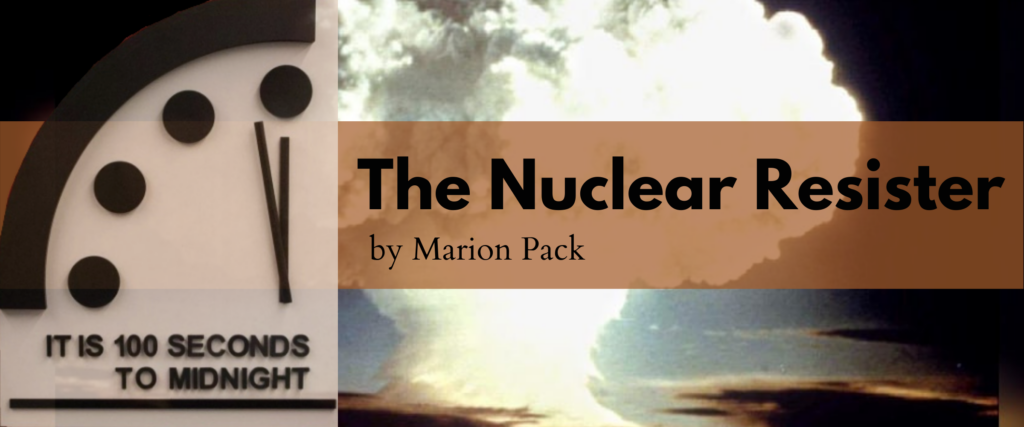
The Nuclear Resister by Marion Pack
This Nuclear Resister column in this PI newsletter is a press release from three of the major peace organizations. With a new administration come new opportunities, to not only reverse the damage done by the past administration, but move forward new opportunities. Plutonium Pits are crucial in the development of new nuclear weapons. No new Pits, no new nuclear weapons.
For immediate release, February 11, 2021
Biden Administration Asked to Review Plutonium Pit
Expansion Plans
Public interest organizations sent a letter to the U.S. Department of Energy (DOE) requesting that it address calls for a rigorous environmental review of plans to expand production of nuclear bomb cores at the Los Alamos National Laboratory in New Mexico and the Savannah River Site in Aiken, South Carolina.
The non-profit groups—Nuclear Watch New Mexico, SRS Watch and Tri-Valley Communities Against a Radioactive Environment—have previously submitted a number of formal comments and information related to the environmental and public health risks associated with a significant expansion of plutonium “pit” production at the two DOE sites.
The three organizations’ documents, which include several legal filings since 2019, were consolidated and re-submitted on Wednesday so the DOE under the new Biden administration has “immediate access to these documents,” the letter states.
Of key concern among the three public interest groups is the necessity of preparing a legally mandated Programmatic Environmental Impact Statement (PEIS) analyzing the potential impacts under the National Environmental Policy Act (NEPA) at all relevant DOE sites. The groups want to ensure that the administrative record is intact and that reconsideration of the PEIS be undertaken before legal action is pursued.
“We are hopeful that a review of programs with significant environmental impacts under NEPA will return to normalcy with the new presidential administration,” said Leslie Lenhardt, staff attorney for the South Carolina Environmental Law Project, a non-profit environmental law firm representing the organizations. “DOE and the National Nuclear Security Administration have a new opportunity to revisit their prior refusal to conduct a PEIS for this critical issue.”
In 2018, in an effort to expand and refurbish the nation’s nuclear weapons stockpile, the Trump administration proposed producing at least 80 pits a year—30 at the existing Los Alamos site and 50 at the Savannah River Site.
At Los Alamos, pit production has been plagued by a long history of safety issues, yet DOE is proposing to increase production by 50 percent at that location. At the Savannah River Site, which has never produced pits, the DOE is seeking to convert the never-finished Mixed Oxide (MOX) Fuel Fabrication Facility into a pit factory. The failed MOX facility wasted billions of taxpayer dollars and was not designed for producing nuclear war heads.
Pit production entails processing hazardous and radioactive materials and would significantly increase the amount of nuclear and toxic wastes generated at the Savannah River Site and Los Alamos. In addition to the possibility that plutonium could be stranded at the sites, drastically increasing the nation’s plutonium pit processing capability means more waste needs to be treated, stored or disposed of—a risk for surrounding communities who may be impacted by the release of these materials.
The groups say the DOE is required to analyze the collective environmental impacts at the multiple production sites as well as impacts on the waste isolation pilot plant in New Mexico, where the agency plans to dispose of plutonium pit wastes without adequate review. The groups strongly affirm that the public has the right to participate in the PEIS decision-making process pursuant to the National Environmental Policy Act.
“While we fully anticipate the Biden administration will affirm the need to prepare the PEIS on expansion of plutonium pit production, we remain ready to bring a lawsuit under NEPA,” said Tom Clements, director of SRS Watch.
Marylia Kelley, executive director of the Livermore-based Tri-Valley CAREs noted that the “driver for expanded pit production is a novel warhead design underway at Livermore lab in California. Under NEPA, the agency must consider the DOE-complex wide impacts of this proposal in a thoroughgoing programmatic review.”
Jay Coghlan of Nuclear Watch New Mexico added, “It’s important to note that no future pit production is to maintain the safety and reliability of the existing nuclear weapons stockpile. Instead, it is for speculative new nuclear weapons designs that can’t be tested because of the international testing moratorium, or perhaps worse yet may prompt the U.S. back into testing, after which surely other nations would follow.”
Media Contacts:
Leslie Lenhardt, South Carolina Environmental Law Project, (843) 527-0078, leslie@scelp.org
Marylia Kelley, Tri-Valley CAREs, in CA, (925) 255-3589, marylia@earthlink.net
Tom Clements, SRS Watch, in S. Carolina, (803) 834-3084, tomclements329@cs.com
Jay Coghlan, Nuclear Watch NM, (505) 989-7342, c. (505) 470-3154, jay@nukewatch.org
